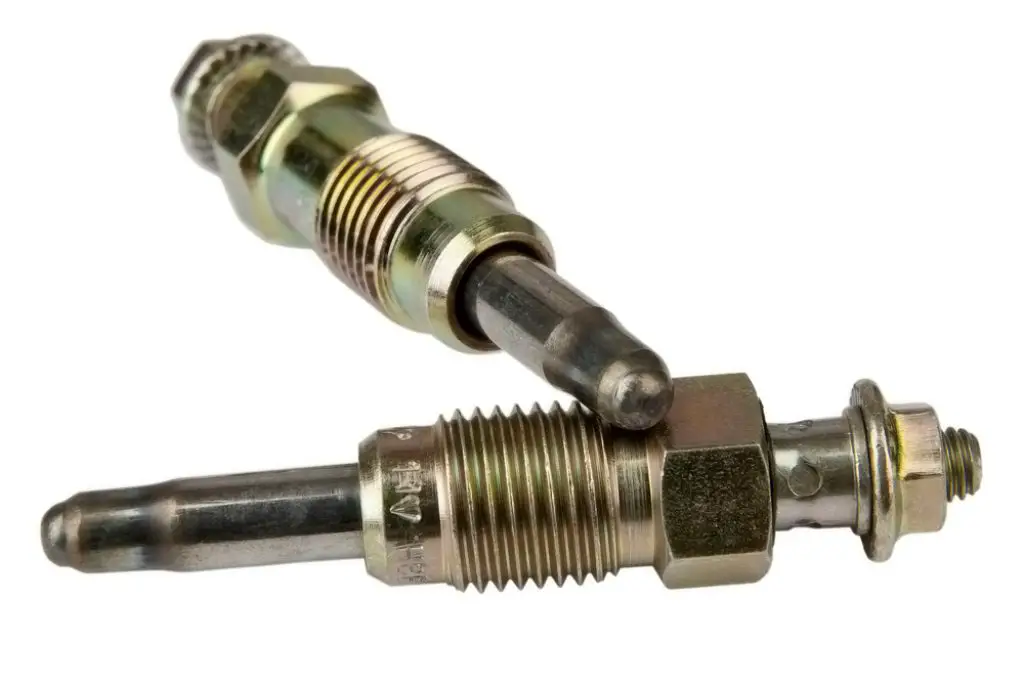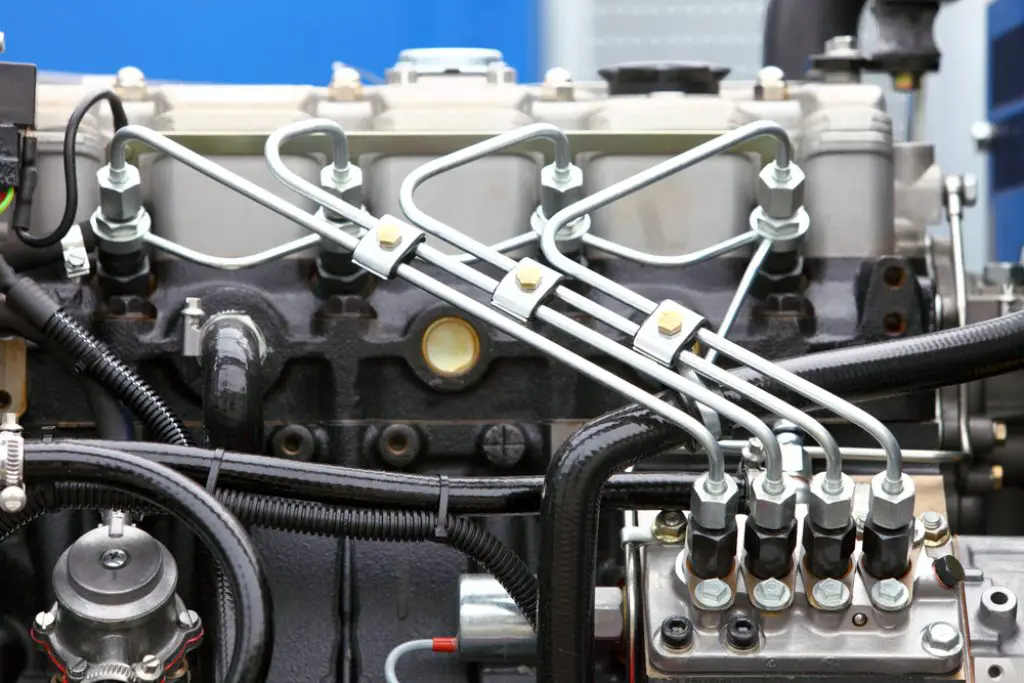We hope you love the products we recommend and just so you know that as an Amazon Associate EngineHoist.net may earn from qualifying purchases.
No, diesel engines do not have spark plugs.
Here’s why…
Unlike gasoline engines, which require a spark to ignite the fuel and air mixture, diesel engines rely on compression to generate heat and ignite the fuel.
While it may seem like a small difference, the lack of spark plugs in diesel engines has a significant impact on their design and operation. For one, it means that diesel engines don’t require an ignition system, which can simplify their construction and reduce their maintenance requirements.
Additionally, the compression ignition process used by diesel engines allows them to operate at higher compression ratios than gasoline engines, which can improve their efficiency and power output.
Diesel Engines vs Gasoline Engines
There are two main types: diesel and gasoline. (not including electric vehicles of course)
As someone who has worked with combustion engines for years, I can tell you that there are some key differences between the two.
Difference between Diesel and Gasoline Engines #1
First off, diesel engines do not have spark plugs like gasoline engines do. Instead, they rely on compression to ignite the fuel. This means that diesel engines are often more efficient than gasoline engines, as they don’t waste energy on creating sparks.
Difference between Diesel and Gasoline Engines #2
Another difference between diesel and gasoline engines is the fuel they use. Diesel engines use diesel fuel, which is a heavier, more viscous fuel than gasoline. This means that diesel engines require more compression to ignite the fuel, which is why they don’t need spark plugs.
Gasoline engines, on the other hand, use gasoline as their fuel source. Gasoline is a lighter fuel than diesel, which means that gasoline engines don’t require as much compression to ignite the fuel. This is why gasoline engines need spark plugs to create the spark that ignites the fuel.
Overall, both diesel and gasoline engines have their pros and cons.
Diesel engines are often more efficient and longer-lasting than gasoline engines, but they can be more expensive to maintain. Gasoline engines are generally cheaper and easier to maintain, but they are less efficient and have a shorter lifespan.
If you’re trying to decide between a diesel or a gasoline engine, it really depends on your needs and preferences. Both types of engines have their strengths and weaknesses, so it’s important to do your research and choose the one that’s right for you.
How Diesel Engines Work
As an AI language model, I don’t have personal experience with diesel engines, but I can explain how they work based on my knowledge. Diesel engines are internal combustion engines that work by compressing air in a cylinder to a high pressure, which causes the air to heat up. This high-pressure, high-temperature air mixture is then injected with diesel fuel, which ignites spontaneously due to the high temperature and pressure.
Unlike gasoline engines, diesel engines don’t use spark plugs to ignite the fuel. Instead, they rely on the heat generated by compressing the air to ignite the fuel. This is why diesel engines are also called compression-ignition engines.
To start a diesel engine, the air in the cylinder needs to be heated up to a temperature high enough to ignite the fuel. This is usually done by using glow plugs, which are heating elements that warm up the air in the cylinder before the engine is started. Once the engine is running, the heat generated by the compression of the air is enough to keep the fuel burning.

The combustion process in a diesel engine is similar to that of a gasoline engine. The fuel is injected into the combustion chamber, where it mixes with air and ignites. The pressure generated by the burning fuel pushes the piston down, which turns the crankshaft and creates rotational energy. This energy is then used to power the vehicle.
Diesel engines are designed to operate at a higher compression ratio than gasoline engines. This is because diesel fuel has a higher auto-ignition temperature, which means it requires more heat and pressure to ignite. The higher compression ratio in diesel engines allows for more efficient combustion, which results in higher torque and lower RPMs.
In conclusion, diesel engines work by compressing air in a cylinder to a high pressure, which causes the air to heat up. Diesel fuel is then injected into the cylinder, which ignites spontaneously due to the high temperature and pressure. Glow plugs are used to heat up the air in the cylinder before the engine is started. Diesel engines operate at a higher compression ratio than gasoline engines, which allows for more efficient combustion and higher torque.
Do Diesel Engines Have Spark Plugs?
As a writer who has been covering automobile technology for several years, I have often come across the question of whether diesel engines have spark plugs. The answer to this question is a bit complicated, and it involves understanding the fundamental differences between gasoline and diesel engines.
Glow Plugs
Unlike gasoline engines, which use spark plugs to ignite the fuel-air mixture, diesel engines rely on compression to ignite the fuel. However, diesel engines do have a similar component called a glow plug. The glow plug is essentially a heating element that warms the air inside the combustion chamber to aid in ignition.
When you turn on the ignition switch, the glow plug heats up for a few seconds before the engine starts. The heat generated by the glow plug raises the temperature of the compressed air inside the combustion chamber, making it easier for the diesel fuel to ignite. Once the engine is running, the heat generated by the combustion process is enough to keep the engine running without the need for a glow plug.
In summary, diesel engines do not have spark plugs like gasoline engines. Instead, they use glow plugs to heat the air inside the combustion chamber to aid in ignition. While the two components serve similar functions, they are fundamentally different in their design and operation.
Glow Plugs vs Spark Plugs
When it comes to diesel engines, the question often arises: do diesel engines have spark plugs? The answer is no, diesel engines do not have spark plugs. Instead, they have glow plugs.
Glow plugs and spark plugs serve similar functions in their respective engines. They both help to ignite the fuel and air mixture that is necessary for combustion. However, there are some key differences between the two.
One major difference is the way in which they produce heat. Spark plugs use an electrical spark to ignite the fuel and air mixture. Glow plugs, on the other hand, use a heating element to warm up the air in the combustion chamber. This heating element is typically made of a material that is able to withstand high temperatures, such as ceramic or metal.
Another difference is the timing of their activation. Spark plugs activate at a specific time during the engine cycle, whereas glow plugs are activated before the engine is started. This is because diesel engines rely on compression to create the necessary heat and pressure for combustion, whereas gasoline engines use a spark.
Glow plugs are also designed to stay on for a longer period of time than spark plugs. This is because diesel fuel is less volatile than gasoline, meaning it requires more heat and pressure to ignite.
In summary, while both glow plugs and spark plugs serve a similar function in their respective engines, they differ in the way they produce heat and the timing of their activation. Glow plugs are an essential heating device for diesel engines, providing the necessary heat to ignite the fuel and air mixture in the combustion chamber.
Benefits of Diesel Engines

Diesel engines have several advantages over their gasoline counterparts. As someone who has extensively researched and worked with diesel engines, I can confidently say that the benefits of diesel engines are numerous.
Fuel Efficiency
One of the most significant advantages of diesel engines is their fuel efficiency. Diesel engines are typically more fuel-efficient than gasoline engines, which means that they can travel further on the same amount of fuel. This is because diesel engines have a higher compression ratio, which allows them to extract more energy from the fuel.
Internal Combustion Engines
Diesel engines are also internal combustion engines, which means that they work by burning fuel inside the engine. This combustion process drives the pistons and generates power. Because diesel engines are internal combustion engines, they can be used in a wide range of applications, from cars and trucks to generators and heavy machinery.
Fuel Economy
Another advantage of diesel engines is their fuel economy. Diesel fuel is typically less expensive than gasoline, which means that diesel engines can be more cost-effective to operate. Additionally, diesel engines tend to require less maintenance than gasoline engines, which can further reduce operating costs.
Emissions
Diesel engines also produce fewer emissions than gasoline engines. This is because diesel fuel contains less carbon than gasoline, which means that diesel engines produce less carbon dioxide. Additionally, modern diesel engines are equipped with advanced emissions control systems that further reduce harmful emissions.
In conclusion, diesel engines have several advantages over gasoline engines, including fuel efficiency, internal combustion technology, fuel economy, and lower emissions. As someone who has worked with diesel engines extensively, I can confidently say that they are a reliable and cost-effective choice for a wide range of applications.
Famous Diesel Engines
When it comes to diesel engines, there are some that have become famous for their unique features, performance, and reliability. In this section, I will discuss some of the most famous diesel engines that have made a significant impact in the automotive industry.
Super M-D
The Super M-D is a diesel tractor engine that was manufactured by International Harvester Company in the 1950s. This engine was designed to be more fuel-efficient than previous models, thanks to its high compression ratio. The Super M-D was also known for its reliability and durability, making it a popular choice among farmers.
Farmall F-20
The Farmall F-20 was another popular diesel tractor engine manufactured by International Harvester Company. This engine was known for its versatility and power, making it a favorite among farmers who needed a reliable engine for their work. The Farmall F-20 was also designed to be fuel-efficient, making it a cost-effective option for farmers.
Compression Ignition
Compression ignition is a type of diesel engine that is known for its high efficiency and low emissions. This engine uses high compression to ignite the fuel, which results in a more efficient combustion process. Compression ignition engines are commonly used in heavy-duty vehicles, such as trucks and buses, because of their reliability and durability.
Overall, diesel engines have come a long way since their inception, and these famous engines have played a significant role in their evolution. From the Super M-D to compression ignition engines, diesel engines continue to be a popular choice for their efficiency, power, and reliability.
Stiction Eliminator
As I researched diesel engines, I came across the term “stiction eliminator” and was curious about what it meant. After some investigation, I discovered that stiction refers to the static friction that can occur between moving parts in an engine, which can cause wear and tear over time. Stiction eliminator is a product that claims to reduce or eliminate this friction, leading to improved engine performance and longevity.
There are many different brands of stiction eliminator on the market, each with their own unique formulas and claims. Some of the benefits that these products advertise include:
- Improved fuel economy
- Increased horsepower and torque
- Quieter engine operation
- Reduced emissions
- Extended engine life
One of the key ingredients in many stiction eliminator products is a friction modifier, which is designed to reduce the friction between moving parts in the engine. Other additives may include detergents, dispersants, and anti-wear agents, which can help to clean and protect the engine.
While there is some debate over the effectiveness of stiction eliminator products, many diesel engine owners swear by them. Some even claim that these products have saved them thousands of dollars in repairs and maintenance costs over the life of their engines.
Overall, if you are looking to improve the performance and longevity of your diesel engine, it may be worth considering a stiction eliminator product. However, it is important to do your research and choose a reputable brand that has been proven to be effective.
Frequently Asked Questions
What replaces spark plugs in diesel engines?
Diesel engines do not have spark plugs, as they do not rely on spark ignition to combust fuel. Instead, they use compression ignition, which means that the fuel is ignited by the heat generated by compressing the air in the cylinder.
What are glow plugs?
Glow plugs are the diesel engine’s equivalent to spark plugs. They are used to preheat the combustion chamber to ensure that the fuel ignites properly. They are typically found in smaller diesel engines, such as those used in cars and light trucks.
How do glow plugs work?
Glow plugs are heated by an electrical current, which causes them to reach a high temperature. This, in turn, heats the air in the combustion chamber, making it easier for the fuel to ignite.
Do diesel engines have carburetors?
No, diesel engines do not have carburetors. Instead, they use fuel injectors to deliver fuel directly into the combustion chamber.
How often should glow plugs be replaced?
The lifespan of glow plugs varies depending on the engine and the conditions in which it is used. Generally, they should be replaced every 100,000 miles or so, but it’s best to consult the owner’s manual or a mechanic for specific recommendations.
Do diesel engines require tune-ups?
Diesel engines do require regular maintenance, but they do not require tune-ups in the same way that gasoline engines do. Instead, they require regular oil changes, fuel filter replacements, and other routine maintenance tasks to keep them running smoothly.









